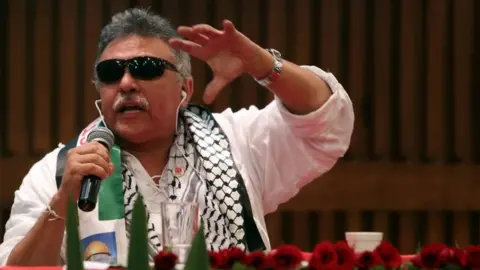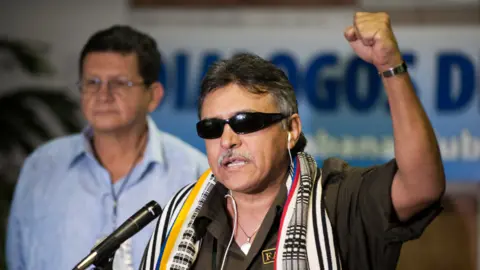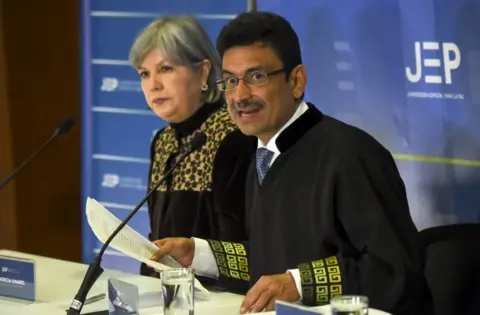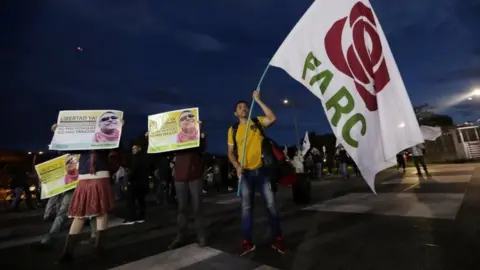Colombia peace process: Ex-rebel Santrich to be freed
 EPA
EPAA special court in Colombia has ruled that a former leader of the Farc rebel group should not be extradited to the US where he is facing drug trafficking charges.
The court has ordered the release of Jesús Santrich, a former guerrilla fighter who was detained in April 2018.
Colombia's attorney-general has stepped down in protest at the ruling.
President Iván Duque said he was confident the decision would be overturned on appeal.
Who is Jesús Santrich?
Jesús Santrich is the nom de guerre of Seuxis Pausias Hernández Solarte, a former commander in the Revolutionary Armed Forces of Colombia (Farc), a Marxist rebel group founded in Colombia which engaged in a five-decade-long armed struggle against government forces and right-wing paramilitaries.
 AFP
AFPHe joined the rebel group after a student friend of his was killed by Colombian security forces. Jesús Santrich was the name of the killed friend and it was in his honour that the philosophy student adopted it as his pseudonym.
Santrich is partially blind, having gradually lost his sight due to a genetic condition.
He was a member of the rebel group for 30 years and one of their most hard-line negotiators in the process which led to a peace agreement in 2016.
Members of the government negotiating team say he would spend hours discussing every word in the agreement and often make ironic comments.

More about Colombia's armed conflict:

What are the charges against him?
Santrich was indicted last year by a grand jury in the US for conspiracy to export 10 tonnes of cocaine to the United States.
The indictment alleges that the cocaine was smuggled into the US roughly between June 2017 and April 2018, after the Farc rebel group signed its peace deal with the Colombian government.
During the armed conflict, the Farc derived much of its financing from drug smuggling, extortion and ransom requests.
Jesús Santrich was detained in April 2018 after a US court issued an arrest warrant and extradition request.
He was jailed before he could take up one of the seats in Congress which under the term of the peace agreement had been guaranteed to the party founded by the Farc rebels.
Who made the ruling?
The decision on whether to extradite Jesús Santrich was taken by the Special Jurisdiction for Peace, a tribunal set up to deal with alleged crimes committed during the five-decade-long armed conflict.
 AFP
AFPThe court, known as JEP by its initials in Spanish, was set up to try all participants in the conflict, be they Farc rebels or state actors, and will be in place for 10 years.
The JEP has jurisdiction over all crimes allegedly committed during the conflict but not those after the conflict ended, therefore the timing of Santrich's alleged drug trafficking was key to the JEP's decision.
What did the court say?
The JEP said the US justice department had not answered its request for evidence linking Jesús Santrich to the drug trafficking nor for evidence showing when the alleged crimes had taken place.
It said that audio files provided by the US justice department were not enough to suggest Jesús Santrich had engaged in drug trafficking.
It ruled that he should be set free immediately.
What has the reaction been?
Colombian Attorney-General Néstor Humberto Martínez stepped down saying that "my conscience and my devotion to the rule of law prevent me" from freeing Santrich.
 Reuters
ReutersHe argued that the evidence against Jesús Santrich was "conclusive, unequivocal" and urged the public "to press with determination for the restoration of legality in Colombia and the defence of peace".
In a speech following the decision by the JEP, President Duque said he was "indignant" that Jesús Santrich would be released. "This case is not closed," he said referring to the appeal Colombian authorities said they would lodge against the decision.
Mr Duque is a close ally of the US and has been critical of the elements of the peace deal. He was among those campaigning for a "no" vote in a referendum held in 2016 in which Colombians were asked whether they backed the deal.
The Farc, the party created by former ex-rebels after they dissolved their guerrilla group, welcomed the court's ruling and its supporters celebrated by waving posters of Jesús Santrich.